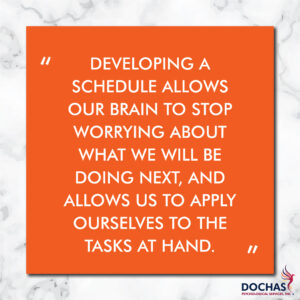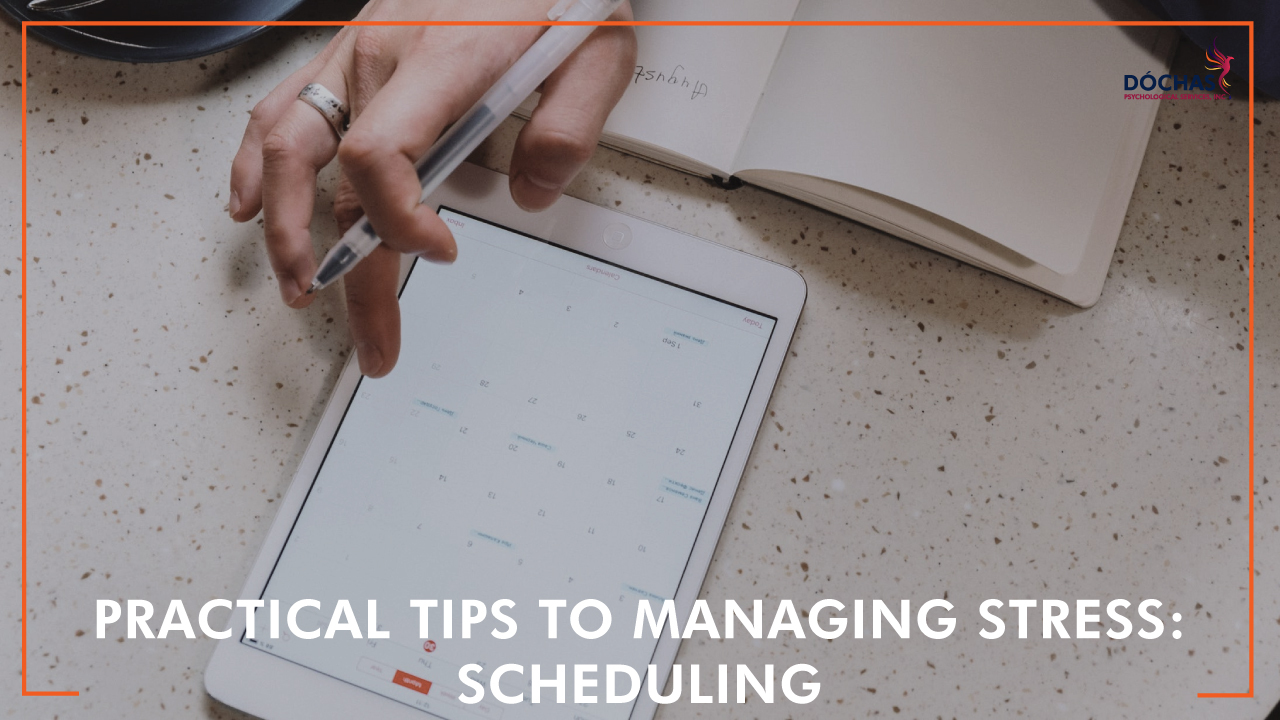Hello! It’s Rachael here on the Dóchas blog, and I’d like to share another practical tip for managing stress: scheduling.
I know the first time someone suggested I start scheduling my life more, I was horrified and adamantly believed that it would ruin the spontaneity of my life and make me less happy. But oh, boy! Was I ever wrong. Scheduling, just like to-do lists, helps reduce anxiety and helps us better achieve our goals. As gross as I find the word routine, I often function better when I have one. Developing a schedule allows our brain to stop worrying about what we will be doing next, or worrying about the things we need to get done, and allows us to better focus and apply ourselves to the tasks at hand.
When we are trying to balance work and/or school with our home life, and then add in a social life and self-care, it is easy to become too busy. Scheduling is an essential skill to help manage the hecticness of life. And if you have a family, using a schedule also helps to ensure everyone knows what is going on. This helps to reduce anxiety, especially for children.
How to make a schedule:
- Create a base schedule. A base schedule includes your regularly scheduled activities, such as work, and includes the times when you will be getting up and ending your day.
- Adapt the schedule to the current week. This means you add in any important and urgent tasks from your to-do lists or any upcoming events.
- Add in an activity schedule. Activity scheduling, also known as Behavioural Activation, is an evidence-based therapeutic technique used to help alleviate symptoms of depression by scheduling pleasant activities that help to improve mood. These activities would include your self-care, social time, and fun activities.
Example Schedule:

This sample is just a base schedule, which contains weekly reoccurring tasks.
Schedules can be as detailed as you like. Personally, I prefer the be a little more ambiguous in mine as it allows me to be more flexible and experience less stress when things go off track. With this schedule, wake-up means getting up, having breakfast, doing my morning social media check, and walking the dog. Essentially, each time block has a heading, and then I have a little to-do list of things I do in that time frame.
However, some people find it more helpful to break the schedule down in more detail, such as 8 am wake-up, 8:15 am feed and walk the dog, 8:45 am have breakfast and check socials, 9:30 am get ready to leave for work. Use whatever strategy works best for you!
Tips for scheduling:
- Remember to be flexible! This isn’t supposed to be a detailed plan of every minute of your life that can never change. It’s a guideline for tasks and activities.
- Don’t overschedule! It can be tempting to fill every minute of every day since we have so much to do, but having downtime, social activities, and time without scheduling is arguably just as important as doing the laundry.
- Test out a schedule for a few weeks and then adjust it. The first week or two of using your schedule may feel a little clunky and weird so you don’t want to make too many changes or throw it out the window right from the get-go.
- You can use a daily, weekly, or monthly schedule, or all three! I use a variation of all three. A monthly calendar that has one-time events, like appointments or social obligations on it, and a weekly schedule. Then on busy workdays, I’ll create a daily schedule to help me stay on task and focus.
- Customize it! Not everyone’s lives are the same and not everyone’s schedules are the same, so don’t try and force yours to match someone else’s. For example, I work on weekends, so I do my weekly schedule on Thursday evenings to prepare for my work week. Some people prefer to do it at the end of their work week or during their downtime during the weekend.
- WRITE IT DOWN! Having the schedule written down allows our brain to stop focusing attention on it and our to-do lists. Without writing it down, we are just adding more junk for our brain to mull over.

Those were some practical tips to manage stress by creating a schedule! I hope this helps you feel more in control of your tasks and to-dos. However, sometimes you need an extra helping hand to manage stress. If you’d like to talk to a professional about your stress, reach out to us here at Dóchas Psychological Services, either at 780 446 0300 or by email at info@dochaspsych.com.
About Dóchas Psychological
Dóchas Psychological Services is a well-established and trusted therapy clinic located in Spruce Grove, Alberta. At Dóchas we value the idea that everyone deserves a safe space. Through connection and education, our team works hard to build a trustworthy relationship with each of our clients. It is our goal to create a community for our clients to feel like they belong.
Disclaimer
Information provided through Dóchas Psychological Services blogs or vlogs is meant for educational purposes only. They are NOT medical or mental health advice. You can read more about our disclaimer here.










